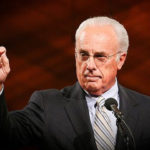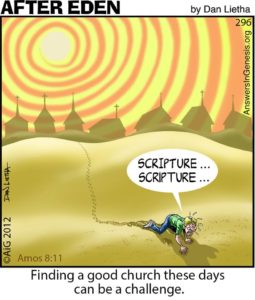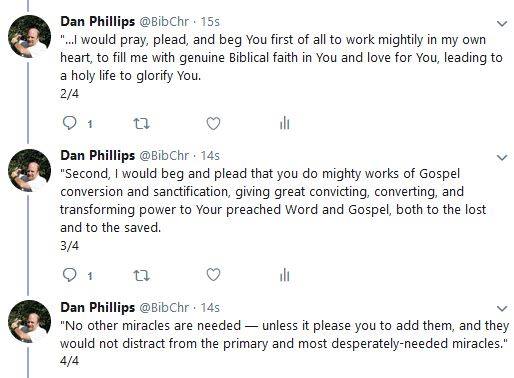Nathan Busenitz: Lecture, including PowerPoint slides at this link.
Only For A Time
 Article by Nick Batzig, organizing pastor of New Covenant Presbyterian Church in Richmond Hill, Ga. (original source at this link)
Article by Nick Batzig, organizing pastor of New Covenant Presbyterian Church in Richmond Hill, Ga. (original source at this link)
I was interested to see that the cessationism/continuitionism issue is surfacing again–due to Matt Chandler’s recent sermon, “A Supernatural Community and a Personal Word.” Matt’s introductory argument is as follows: Many Christians do not experience the extraordinary gifts of the Spirit (i.e. tongues, prophecy, knowledge, healings, etc.); therefore, they have wrongly concluded that the extraordinary gifts have ceased and that everything in the book of Acts is merely history. Without wanting to analyze and critique Matt’s arguments here in any sort of detailed way, I do want to make a few important observations about the fallacy of that argument in particular, based on the biblical rationale for cessationism.
First, it is unfair and uncharitable for someone to insist that brothers and sisters in Christ have adopted a cessationist understanding of the extraordinary gifts of the Spirit simply because they have not experienced them in their lives. In fact, all the cessationist I personally know are convinced by the teaching of Scripture that tongues, prophecy and mediated extraordinary healings have ceased. After all, the word “cease” comes straight out of 1 Corinthians 13:8, where the Apostle Paul said, “As for prophecies, they will pass away; as for tongues, they will cease; as for knowledge, it will pass away.”
In 1 Corinthians 13, Paul contrasts three of the supernatural (i.e. extraordinary) gifts of the Spirit (i.e. tongues, prophecy and knowledge) with three of the ordinary gifts of the Spirit (i.e. faith, hope and love). He then says that the extraordinary gifts would cease and pass away, while the ordinary gifts would remain. Finally, Paul teaches that love is the greatest because love endures forever. Elsewhere, Paul teaches that “faith will be turned to sight,” and “hope that is seen is not hope.” He is clearly intimating that during the New Covenant era of human history, faith, hope and love would continue, while, at some point, tongues, prophecy and knowledge would cease. Then, after the consummation, only love would remain. That’s why love is the greatest of the gifts of the Spirit!
Believers should be far more zealous for a manifestation of the Spirit’s power in their lives resulting in the formation of the ordinary gifts of the Spirit (i.e. the fruit of the Spirit) than they should be for temporal and foundational extraordinary gifts. To reverse the order is to fall into the same error as that which the Corinthians had fallen into. In so doing, we may inadvertantly be undermining the force of the argument Paul makes in 1 Corinthians 13.
Concerning the foundational nature of the extraordinary gifts of the Spirit, the Apostle Paul employed the word foundation when he says in Ephesians 2:20, that the church is “built on the foundation of the apostles and prophets, Christ Jesus himself being the cornerstone.”1 The Apostles and NT prophets were instrumental in laying the foundation of the New Covenant church. In Ephesians 3:4-5, the Apostle explains that the setting forth of the mystery of Christ in the Scripture was the end goal of the foundational work of the Apostles and prophets. He explained this when he wrote:
“When you read this, you can perceive my insight into the mystery of Christ, which was not made known to the sons of men in other generations as it has now been revealed to his holy apostles and prophets by the Spirit.”
Finally, Paul lists the Apostles and prophets among the gift officers that Christ gave His church after ascending to heaven. In Ephesians 4:11, Paul writes, “He gave the apostles, the prophets, the evangelists, the shepherds and teachers, to equip the saints for the work of ministry, for building up the body of Christ.” In short, if there are no more Apostles (and Paul made it clear that he was the last Apostle – see 1 Cor. 15:8), then there are no more prophets either. The grammatical construct “Apostles and prophets” was used to delineate a special foundational provision for the foundation of the New Covenant church. Anyone who has ever built a house knows that you only lay a foundation once!
The extraordinary gifts of the Spirit, given in the Apostolic age, were signs of the coming of the Kingdom of God to the nations. The Apostle Paul explicitly highlighted the sign nature of the gifts, as being attached to the Apostolic ministry, when he wrote, “The signs of a true apostle were performed among you with utmost patience, with signs and wonders and mighty works” (2 Cor. 12:12). This is also the reason why we find the Apostles giving the Spirit and the gifts by the laying on of their hands.
While there has been much debate over whether John Calvin was a cessationist or a continuationist, Calvin’s comments on Acts 2:38 should suffice to settle the question. There, Calvin explained that the extraordinary gifts of the Spirit “lasted only for a time:”
“Because Christ meant to set forth the beginning of his kingdom with those miracles, they lasted only for a time; yet because the visible graces which the Lord did distribute to his did shoe, as it were in a glass, that Christ was the giver of the Spirit, therefore, that which Peter saith doth in some respect appertain unto all the whole Church: ye shall receive the gift of the Spirit. For although we do not receive it, that we may speak with tongues, that we may be prophets, that we may cure the sick, that we may work miracles; yet is it given us for a better use, that we may believe with the heart unto righteousness, that our tongues may be framed unto true confession, (Romans 10:10) that we may pass from death to life, (John 5:24) that we, which are poor and empty, may be made rich, that we may withstand Satan and the world stoutly.”
Concerning the laying on of the hands of the Apostles in the imparting of the extraordinary gifts of the Spirit, Calvin explained, in his comments on Acts 19:6, that it was “a grace that lasted only for a time.” He wrote:
“This laying on of hands…was a grace which was to last only for a time, which was showed by that sign, it is a perverse and ridiculous thing to retain the sign since the truth is taken away. There is another respect of baptism and the supper, wherein the Lord doth testify that those gifts are laid open for us, which the Church shall enjoy even until the end of the world. Wherefore we must diligently and wisely distinguish perpetual sacraments from those which last only for a time, lest vain and frivolous visures [semblances] have a place among the sacraments.”
Knowing full well, that I haven’t even scratched the surface of this unceasing debate (pun intended), I do hope that what I have written will disabuse anyone of the notion that cessationists, simply on account of a lack of personal experience, have convinced themselves that the extraordinary gifts of the Spirit have ceased–and, that they have, therefore, misread the Bible. One could argue by way of sanctified biblical logic that a lack of experiencing the extraordinary gifts of the Spirit is squarely in keeping with the biblical teaching about their cessation!
1. For a fuller defense of the exegesis of the grammatical construct, see R. Fowler White’s article, “Graffin and Grudem on Ephesians 2:20”.
The False Hope of Purgatory
 Article by John MacArthur (original source here)
Article by John MacArthur (original source here)
Let’s be clear from the outset: The Roman Catholic doctrine of purgatory is taught nowhere in Scripture. It was invented to accommodate Catholicism’s denial of justification by faith alone. And it offers false hope to millions who anticipate ample time beyond the grave—perhaps eons, if necessary—to achieve their own justification.
Scripture very clearly teaches that an absolutely perfect righteousness is necessary for entry into heaven. Jesus said, “I say to you that unless your righteousness surpasses that of the scribes and Pharisees, you will not enter the kingdom of heaven” (Matthew 5:20). He then added, “Therefore you are to be perfect, as your heavenly Father is perfect” (Matthew 5:48)—thus setting the standard as high as it can possibly be set.
The Only Way to Heaven
Later in His ministry, when the rich young ruler approached Jesus to ask how he might enter heaven, Jesus upheld this same standard of absolute perfection. He began by challenging the clear implication that the young man hoped he could attain a sufficient goodness of his own to merit heaven: “Why are you asking Me about what is good? There is only One who is good” (Matthew 19:17). Notice: Jesus did not disclaim that He Himself was sinlessly perfect (a common misinterpretation of this passage). He was simply pointing out plainly that the standard of perfection required to earn heaven is impossible for fallen creatures.
Because the young man was undeterred by this, however, Jesus told him that to obtain eternal life, he must have a track record of perfect obedience to the law (Matthew 19:17-22). Again and again, Jesus made the required standard of righteousness impossibly high for all who would seek to earn God’s favor on their own.
The young ruler clearly did not understand or acknowledge his own sinfulness. He assured Jesus that he had indeed kept the law from his youth up (v. 20).
Jesus subtly pointed out the young man’s covetousness (v. 21), which was a violation of the tenth commandment. From the outset of His conversation with the young man, the Lord was prodding him to confess that no one but God Himself is truly good. But the rich young ruler was unwilling to face his own sinfulness, and so he went away without salvation.
The disciples marveled at this. The young man was evidently—from a human perspective—one of the most righteous individuals they’d encountered. Notice that no one disputed his claim that he had obeyed the law. That suggests there were no overt sins in his life that anyone could point to. He seemed the best of men. So the disciples were floored when he walked away with no assurance of eternal life from Jesus. In fact, Jesus told them, “Truly I say to you, it is hard for a rich man to enter the kingdom of heaven. Again I say to you, it is easier for a camel to go through the eye of a needle, than for a rich man to enter the kingdom of God” (Matthew 19:23-24).
There’s no mistaking Jesus’ point. He was setting the standard at an impossible height. He was saying that the most fastidious legal observance is not enough. The most flawless external righteousness is not enough. All the worldly advantages of wealth are of no help. Only absolute perfection is acceptable to God. Our Lord kept underscoring these truths because He wanted people to see the utter futility of trying to earn righteousness by any system of works.
The disciples got the message. They asked, “Then who can be saved?” (Matthew 19:25).
And Jesus replied, “With people this is impossible, but with God all things are possible” (Matthew 19:26).
Accepted By Imputation
We know from Paul’s treatise on justification in Romans 4 that God saves believers by imputing to them the merit of Christ’s perfect righteousness—by no means because of their own righteousness. God accepts believers “in Christ.” He clothes them with the perfect righteousness of Christ. He declares them perfectly righteous because of Christ. Their sins have been imputed to Christ, who has paid the full penalty. His righteousness is now imputed to them—and through His imputed righteousness—they receive His full merit. That is what justification by faith means. The Father “made Him who knew no sin to be sin on our behalf, so that we might become the righteousness of God in Him” (2 Corinthians 5:21). Continue reading
Fritz Erbe: The Reformation Figure You’ve Never Heard Of
Dr. James White led the Alpha and Omega Ministries group visiting the Wartburg Castle in Eisenach, Germany, up the South Tower to the entrance of the 30 foot deep dungeon contained therein. There he introduced the group to Fritz Erbe, an Anabaptist imprisoned there from 1541 to 1548 when he died in that very cell. His crime? Non-baptism of his children, a conviction he held by reading the very Bible Luther had translated into German a scant 150 meters away barely 15 years earlier. We reflected upon the realities of sacralism, the State Church, and the Reformation as a whole. A sobering, but necessary, portion of the tour.
7 Things I Love About Liturgical Protestant Worship
 Article by Silverio Gonzalez, husband, father, and staff writer at Core Christianity. He earned his B.A. in Philosophy from the University of California, Santa Barbara, and his Master of Divinity from Westminster Seminary California. (original source here)
Article by Silverio Gonzalez, husband, father, and staff writer at Core Christianity. He earned his B.A. in Philosophy from the University of California, Santa Barbara, and his Master of Divinity from Westminster Seminary California. (original source here)
Sometimes the idea of “formal worship” scares people. I hope to make that less scary. The Protestant traditions include Anglicanism, Lutheranism, the Reformed, and Presbyterianism. Although these traditions have important differences, they reflect important similarities in the way they worship. I could feel more or less at home in any of these traditions. A liturgy is an order of worship in which God gives grace in the gospel and we respond in faith, hope, and love.
1. I love that liturgical Protestant worship is shaped by the Gospel.
Common in Protestant liturgies is a movement from the law of God and our repentance to the Gospel. The Gospel announces our forgiveness and justification. A good liturgy is evangelical in the best sense in that it helps move the congregation through the ordinary patterns of the Christian life. I constantly feel the weight of the week’s sins lifted as I confess my sins in a prayer together with the congregation. Then I hear the pastor preach the gospel, telling me again that my sins are forgiven because of Christ alone.
2. I love that liturgical Protestant worship has specific prayers as part of the service.
In Protestant orders of worship, there is usually a prayer of adoration, a prayer of confession of sin, a pastoral prayer for the needs of the congregation, and a prayer of thanksgiving. Sometimes some of these prayers are expressed in song; other times the entire congregation reads a written prayer. The pastor leads the congregation in these prayers that reflect our unity. Through public prayer, we bear one another’s burdens. When I hear my pastor pray for me, I feel his love for the congregation, and me in particular.
3. I love that liturgical Protestant worship includes lots of Scripture reading throughout the service.
Usually there are readings from the Old and New Testaments, Psalms, Epistles, and Gospels. Sometimes the Psalms are sung. Protestant liturgies include a variety of arrangements and a number of Scripture readings. Hearing so much Scripture read in church is like being washed in God’s Word.
4. I love that liturgical Protestant worship includes the pastor preaching both the law and the gospel from the Bible.
A good sermon doesn’t just tell me about what happened in the past. A good sermon helps me to understand my life as a part of God’s story. A good sermon focuses on what Jesus did—and is doing—to save sinners like me. A good sermon shows me why Jesus had to die. A good sermon shows me how to respond in faith, hope, and love. Protestants preach God’s word of law to humble my proud heart and God’s gospel to show me my savior and remind me how God has promised to work in my life to save me from sin’s penalty and power.
5. I love that liturgical Protestant worship recites creeds.
If you have never been in a church that recites a creed like the Apostles’ Creed, then this is a great reason to visit. When we recite this creed, we recite something that reflects the basics of our faith. The pastor asks, “Congregation, what do you believe?” and we respond with, “I believe in God the Father Almighty….” We confess our common faith together. In this act we connect to the church past, present, and future. We are expressing the one faith that all Christians have sought to maintain for generations.
6. I love that liturgical Protestant worship sings old and new songs.
I love singing old songs, because they remind me of the different cultures and time periods in which God worked. I love singing new songs, because they remind me that the faith is still living, that Christianity is still vibrant today, and that God is still working. Singing new and old songs reminds me that God has promised to gather the nations as his people (Ps. 86:9).
7. I love that liturgical Protestant worship expresses a range of emotions.
Like the Psalms, Protestants know how to mourn, how to praise, how to ask God for our needs, and how to give thanks for what he has already given. When I come to church, I’m not forced to be happy or sad, but I get to express that weird mixture so common to Christians: joy and sorrow, praise and lament, and repentance and faith. I love that I get to express the way I actually feel, and am helped to express the ways I should feel, as I am taught to express the entire range of emotions that are part of the ordinary Christian life.
“Ladies And Gentlemen, This Is The word of God”
 In every sermon I preach I start with these words, “Ladies and Gentlemen, this is the word of God.” Then, the very next words out of my mouth is the Bible being read. In everything that follows, the intention (after much prayer and study beforehand) is to explain the meaning of the text just read, and make application to the hearers. There is no other agenda, nor should there be. The goats might wish for something different, but the sheep want nothing more than an encounter with the Shepherd through His word. This is the genuine move of the Holy Spirit in a congregation – giving the preacher and the hearers a love for the word of God. All else is sinking sand, worthless talk and idolatry. The sheep love to hear His voice. It is true nourishment for their souls. And what is more, they will be back next week, not because something flashy is being promised, not because a special guest speaker will come with something new, but because there is the genuine promise that the word of God will be read, preached, prayed, sung and seen (in the ordinances – baptism and the Lord’s Supper), nothing more and nothing less. And that is all a sheep wants.
In every sermon I preach I start with these words, “Ladies and Gentlemen, this is the word of God.” Then, the very next words out of my mouth is the Bible being read. In everything that follows, the intention (after much prayer and study beforehand) is to explain the meaning of the text just read, and make application to the hearers. There is no other agenda, nor should there be. The goats might wish for something different, but the sheep want nothing more than an encounter with the Shepherd through His word. This is the genuine move of the Holy Spirit in a congregation – giving the preacher and the hearers a love for the word of God. All else is sinking sand, worthless talk and idolatry. The sheep love to hear His voice. It is true nourishment for their souls. And what is more, they will be back next week, not because something flashy is being promised, not because a special guest speaker will come with something new, but because there is the genuine promise that the word of God will be read, preached, prayed, sung and seen (in the ordinances – baptism and the Lord’s Supper), nothing more and nothing less. And that is all a sheep wants.
– John Samson
“My sheep hear My voice, and I know them, and they follow Me; and I give eternal life to them, and they will never perish; and no one will snatch them out of My hand.” – John 10:27,28
Were God to appear to me…
He Must Increase, I Must Decrease
From New Age To Christ
In this powerful interview, Steve Bancarz describes his dramatic conversion to Christ, and why he walked away from being a high prominence writer in the New Age movement with a monthly salary of around $40,000 a month. Along the way, he discusses the pervasiveness of the movement and its teaching which includes pantheism, reincarnation, aliens, UFO’s, yoga, hypnosis and its connection with the demonic realm. You do not want to miss this one!
Dr. Steve Lawson On The Sovereignty of God
A 4 Part Series by Dr. Steve Lawson on The Sovereignty of God:
Session 1 – Radical Corruption: What Can a Dead Man Do?
The Sovereignty of God, Session 2 – Unconditional Election: Who Chose Whom?
The Sovereignty of God, Session 3 – Definite Atonement: For Whom Did Christ Die?
The Sovereignty of God, Session 4 – Sovereign Regeneration: How is one Born Again?

